Megakaryopoiesis and Platelet/Microparticle Biogenesis
Megakaryocytes (Mks) are large, polyploid cells that reside in the bone marrow (BM) and differentiate from CD34+ hematopoietic stem and progenitor cells (HSPCs). Mks migrate to the endothelial lining of BM sinusoids as they mature, and project proplatelets (PPTs) into circulation. PPT then mature in circulation and form platelets, the small anuclear blood cells that regulate thrombosis, vascular repair, and immune responses. As Mks mature, microparticles (MPs) were derived from plasma membrane of Mks into circulation. These MkMPs can specifically target and induce HSPCs into megakaryopoiesis via the delivery of RNA, protein and other cellular molecules.
We are aim to investigate Mk maturation from HSPCs and the biogenesis of platelets for the goal to resolve large platelet needs for transfusion. Furthermore, the production and the application of MkMPs will be developed for the cargo delivery. These strategies are for solving long-standing problems in transfusion medicine, hematopoietic transplantation and gene/RNA delivery to HSPCs for various applications.
Recent Publications:
- Luff SA, Papoutsakis ET. Megakaryocytic Maturation in Response to Shear Flow Is Mediated by the Activator Protein 1 (AP-1) Transcription Factor via Mitogen-activated Protein Kinase (MAPK) Mechanotransduction. J Biol Chem. 2016;291(15):7831-7843.
- Jiang J, Woulfe DS, Papoutsakis ET. Shear enhances thrombopoiesis and formation of microparticles that induce megakaryocytic differentiation of stem cells. Blood. 2014;124(13):2094-2103.
- Lindsey S, Jiang J, Woulfe D, Papoutsakis ET. Platelets from mice lacking the aryl hydrocarbon receptor exhibit defective collagen-dependent signaling. J Thromb Haemost. 2014;12(3):383-394.
